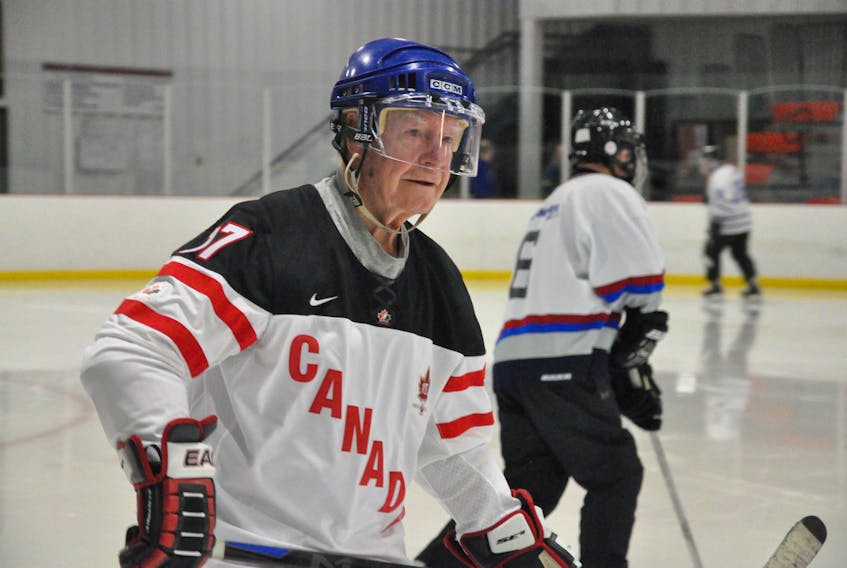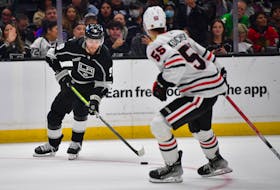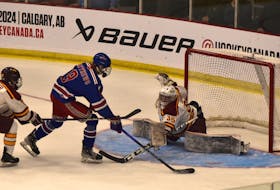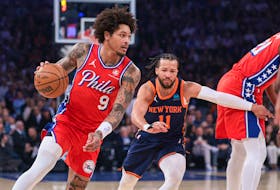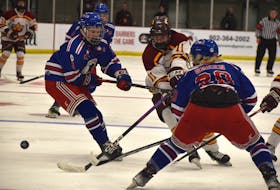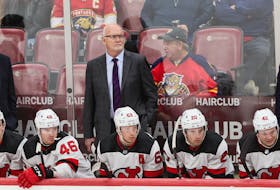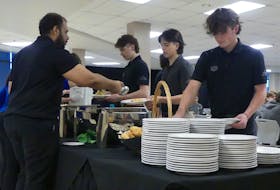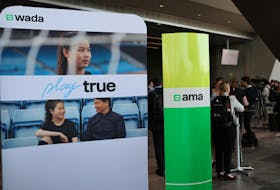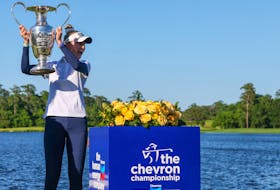ST. JOHN'S, N.L. — What started as a clinic for minor hockey coaches in New Brunswick turned out to be George Faulkner’s big break, and stardom on the international stage 55 years ago in Yugoslavia.
Faulkner, a legendary figure in Newfoundland and Labrador hockey circles, played one season with Canada’s national team, in 1966, and the memories from that year are flooding back this week as the players from that national team era have reunited in St. John’s for their annual summertime get-together.
Seventeen former players from coach Fr. David Bauer’s national teams — from 1964-80 — are in the capital for a 14th reunion.
Bauer, the Hockey Hall of Famer, was the man most responsible for the idea of gathering the top amateur hockey players in Canada to comprise a national team to represent the country in international competition.
By 1965, Faulkner had wound up a five-year pro career in the old Quebec senior pro league in Shawinigan Falls, and was entrenched as the player-coach of Frank Moores’ brand new senior hockey team, the Conception Bay CeeBees.
When he wasn’t on the ice, Faulkner managed the newly opened S.W. Moores Memorial Stadium in Harbour Grace (while rink manager was Faulkner’s official title, everyone knew his real job was playing and coaching the CeeBees).
In 1965, there was a call for minor hockey coaches in Atlantic Canada to attend a coaching clinic in St. Andrew’s, N.B., that summer.
Faulkner was among the 10 or so selected from Newfoundland, and off he went to New Brunswick, where one of the clinicians was Fr. David Bauer, coach of Canada’s national team.
“There was a good group of coaches, from all over the country, and, of course, a lot of them were players, too,” Faulkner recalls.
By mid-week, following a day of lectures, a couple of teams were drafted and a game was organized at a local rink, “like you would,” Faulkner says.
In the stands, presumably passing away some time, was Fr. Bauer.
“After the game,” Faulkner recalls, “Rollie McClenahan, who was the recreation director in St. Andrew’s and who had played in the American league (for six years, and who enjoyed a nine-game stint with the 1945-46 Detroit Red Wings), came to me and said, ‘Fr. Bauer wants to see you.’
“I said, ‘Who’s Fr. Bauer?’”
Faulkner was reminded he was coach of the national team, and being summoned to a meeting could only be a good thing.
“He called me ‘Georgie,’” Faulkner says with a big smile. “He says, ‘Georgie, how would you like to play for Canada’s national hockey team?’
“Just like that. Funny how it works sometimes, huh? It was a lucky shot for me.”
Naturally, Faulkner jumped at the offer, but there was one problem: he had a couple of jobs back in Harbour Grace.
“I told him that I’ll need to get permission, and I don’t know how that will go,” Faulkner said.
Arriving back in Harbour Grace, Faulkner quickly met with Moores to relay the news, the same Frank Moores who would go on to become Newfoundland’s second premier.
“He said, ‘George, b’y, ya got to go.’ And that was it.”

The next question was, when would he report to the national team? Back in the mid-1960s, the annual Trinity-Conception Home Crafts and Agricultural Exhibition at the stadium was a big deal and, as arena manager, Faulkner had to be there.
So he told Bauer he wouldn’t get to training camp in August. Instead, it would likely be late September or early October.
Faulkner felt he was pushing it a bit.
“He said, ‘Whenever you’re ready, come on out,’” Faulkner recalls. “He must have saw something in me. I’m glad he saw something.”
Faulkner eventually did join the national team, and remained in Winnipeg for the 1965-66 hockey season. When he wasn’t travelling across the country, he was south of the border throughout Colorado and Minnesota.
Canada was coming off a pair of disappointing fourth-place finishes, at the 1964 Innsbruck Winter Olympics and 1965 world championship in Finland.
The goal in ’66 was to medal at the world championship, set for Ljubljana, Yugoslavia.
Faulkner, at 33, was one of the team’s elder statesmen, as many of the players were in their mid-20s.
“We didn’t know anything about him … nothing,” said Marshall Johnston, the team’s captain, “but he fit right in right away.”
During his brief fling at pro hockey, Faulkner had proven himself to be a skilful player, averaging almost a point-per-game in Shawinigan Falls and Quebec City.
But his NHL rights belonged to the Montreal Canadiens, and cracking the Canadiens lineup back then was the same as cracking a safe.
“There were a lot of guys,” Johnston said, “and I believe George was one of them, that maybe could have played in the National league if they’d been in another system.”
In early March 1966, the Canadians headed over to Yugoslavia. By Paddy’s Day, they had secured a bronze medal with a 4-2 win over Sweden.
And George Faulkner from Bishop’s Falls, Newfoundland, the newcomer to the Canadian team, led the squad in scoring, with seven goals and 10 points in seven games.
Remember, this came against the best players countries like the Soviet Union and Czechoslovakia could ice.
“Boy,” Johnston says today, during the latest stop of the Nats’ reunion, “he could play. I’m not sure how Fr. Bauer came about selecting him, but it was one of the best decisions he ever made, in my opinion.”
The next year, 1967, Faulkner was back in Harbour Grace, and led the CeeBees to the all-Newfoundland senior hockey championship and the Herder Memorial Trophy.
So good was Faulkner, legend has it he’d be on the ice for over half the game.
The CeeBees clinched their first Herder in Gander, against the Flyers.
The next day, at Fr. Bauer’s request, Faulkner was on a plane headed for Vienna, Austria, and the world championship.
The national team was playing in the ’67 worlds, and Fr. Bauer figured having Faulkner around the team, strumming the guitar and belting out a few tunes, would only buoy the boys’ spirits.
“I couldn’t play or anything because I wasn’t signed,” Faulkner says. “Father figured the guys needed a morale boost.”
After checking into Vienna’s Intercontinental Hotel (the first person he met after stepping out of a taxi was well-known Newfoundland Liberal cabinet minister Joe Ashley of St. John’s), Faulkner rejoined the team.
Offering sage advice and entertaining the boys between games, his presence must have helped, as Canada defended its bronze medal.
It was the last time he’d be associated with the national team.
“I was 34 and the rest of guys were students, so for me to get one year off to play for Canada, well, that was good for me,” he said.
There’s a large segment of the population who still consider George Faukner the best ever from Newfoundland to lace ’em up, despite Daniel Cleary’s 1,059 career NHL games and Stanley Cup win, or Michael Ryder’s 258 NHL goals.
Faulkner is 85 now, and looks like a million bucks. Up until last year, he was still playing a couple or three times a week, though that’s been scaled back.
Not that he’s retired completely. And he’s still got these national team reunions to organize.
“When he came on board with us 55 years ago,” said Johnston, who eventually became an NHL coach and served as the Ottawa Senators general manager, “it took maybe 30 seconds for everyone to hang on to George.
“With his personality, he bonded with everybody right away. He was fantastic then, and he’s still fantastic. He’s probably more responsible than anybody for these reunions over the years, from coast to coast.”

